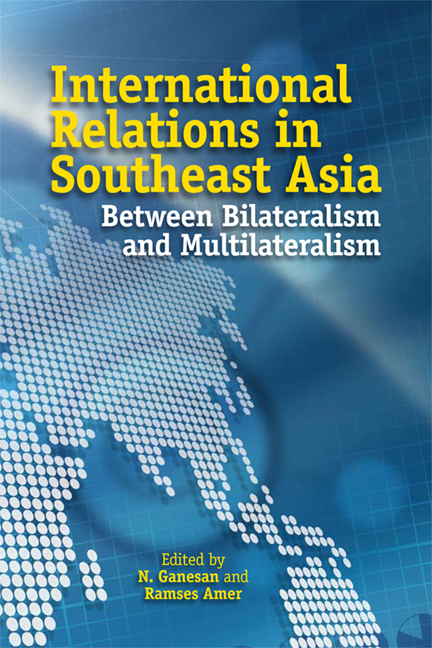Book contents
- Frontmatter
- Contents
- Preface
- List of Abbreviations
- Contributors
- Introduction
- Part I On International Relations
- Part II Case Studies — Mainland Southeast Asia
- Part III Case Studies — Maritime Southeast Asia
- 7 Malaysia-Indonesia Bilateral Relations: Sibling Rivals in a Fraught Family
- 8 Indonesia-Singapore Relations
- 9 Bilateralism and Multilateralism in Malaysia-Philippines Relations
- 10 Malaysia-Singapore Relations: A Bilateral Relationship Defying ASEAN-style Multilateralist Approaches to Conflict Resolution
- 11 Bilateral Relations between Indonesia and the Philippines: Stable and Fully Cooperative
- Conclusion
- Index
8 - Indonesia-Singapore Relations
from Part III - Case Studies — Maritime Southeast Asia
Published online by Cambridge University Press: 18 November 2017
- Frontmatter
- Contents
- Preface
- List of Abbreviations
- Contributors
- Introduction
- Part I On International Relations
- Part II Case Studies — Mainland Southeast Asia
- Part III Case Studies — Maritime Southeast Asia
- 7 Malaysia-Indonesia Bilateral Relations: Sibling Rivals in a Fraught Family
- 8 Indonesia-Singapore Relations
- 9 Bilateralism and Multilateralism in Malaysia-Philippines Relations
- 10 Malaysia-Singapore Relations: A Bilateral Relationship Defying ASEAN-style Multilateralist Approaches to Conflict Resolution
- 11 Bilateral Relations between Indonesia and the Philippines: Stable and Fully Cooperative
- Conclusion
- Index
Summary
The Singapore-Indonesia relationship is commonly described as being subject to sharp fluctuations, shifting between periods of tension and relatively close cooperation. A conventional schema would commence with the period of hostility during Indonesia's Konfrontasi (Confrontation) of Malaysia from 1963 to 1966, which also targeted Singapore by virtue of its temporary inclusion in Malaysia from 1963 until 1965. Diplomatic relations improved with the change of regime in Indonesia, when President Sukarno was ousted by Suharto's New Order government in 1966, deteriorated sharply when Singapore executed two Indonesian marines in 1968, and returned to an increasingly close and cooperative footing from 1973 until the end of the New Order in 1998. Under four successive Indonesian Presidents since 1998, relations have been subject to a number of acerbic exchanges and occasionally obstructive policies, interspersed with declarations of cooperative intent and ongoing close relations in many functional areas.
The current state of bilateral relations appears to be somewhat prone to tension, beneath a veneer of official protestations to the contrary. As detailed below, a number of contentious issues remain outstanding, and progress towards resolving them has stalled since 2007. In the Indonesian press and Parliament, disputes with Singapore over seemingly mundane issues have frequently been magnified, and senior Indonesian politicians have accused Singapore of insincerity in its dealings with Indonesia. Singapore, for its part, has remained officially open to cooperation, but has taken a relatively inflexible line on several contentious issues. As noted with regard to Singapore's relations with its neighbours, bilateral issues “are often kept on hold merely to avoid open conflict”.
This chapter examines patterns of cooperation and conflict between Indonesia and Singapore with a view to understanding why the relationship appears prone to recurrent uneasiness and, during certain periods, difficulty in resolving matters of mutual interest. A number of different potential explanatory factors are examined. The first section asks whether Singapore is in a fundamentally vulnerable position with regard to Indonesia due to structural, historical, or demographic factors, and whether this might explain the apparent sensitivities surrounding the bilateral relationship.
- Type
- Chapter
- Information
- International Relations in Southeast AsiaBetween Bilateralism and Multilateralism, pp. 199 - 224Publisher: ISEAS–Yusof Ishak InstitutePrint publication year: 2010



